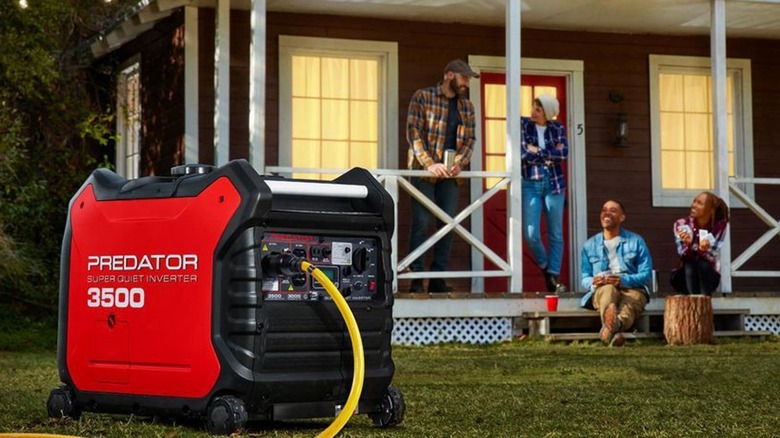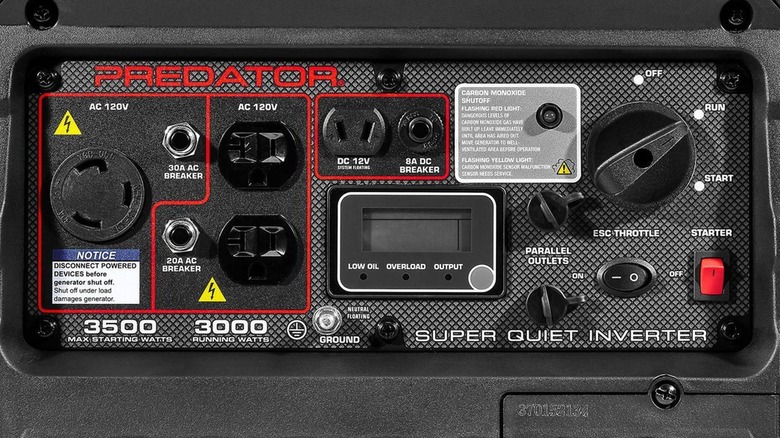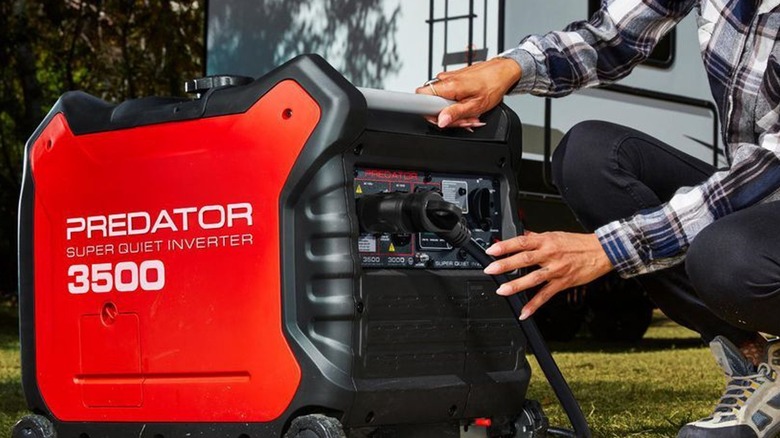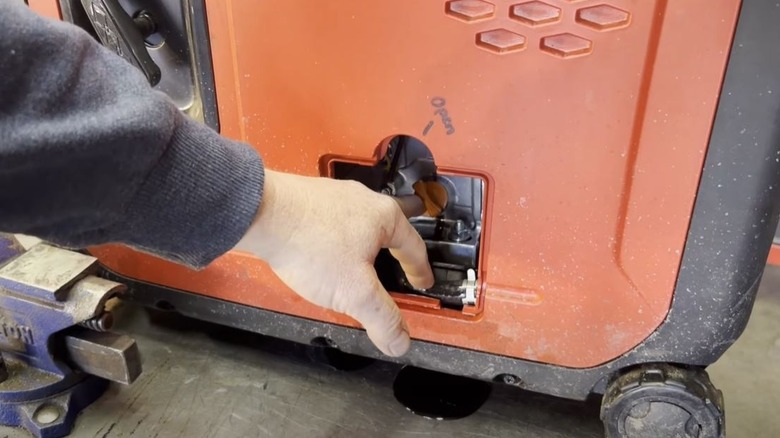5 Reported Problems With Harbor Freight's Predator 3500 Generator
As a tool you generally break out in the event of an emergency situation, a generator is expected to have a certain degree of reliability. Otherwise, what would be the point of something that's supposed to generate power if it's not doing its job properly? As far as reliable generators go, users have had some pretty nice things to say about the Predator 3500, a generator manufactured and sold by the hardware brand Harbor Freight. This generator currently maintains a 4.7 out of 5 user rating on Harbor Freight's online storefront based on 1,759 user reviews, with the vast majority being 5 stars.
However, just because a product is well-regarded doesn't mean it's absolutely infallible. While the majority of the user ratings on the Predator 3500 are positive, there are still a handful of reports, both on Harbor Freight's storefront and on separate forums, of problems with its functionality. A handful of problems doesn't automatically make a product worthless, of course, but it never hurts to have all available information on user experiences before you invest in something, especially when it's a $799 generator.
Generator either starts up and idles down or won't start at all
A generator is, in essence, a small engine that produces power through the usual gas combustion process. It's the same thing that powers your car, a chainsaw, a lawnmower, or anything else equipped with a typical gas engine. If you've ever owned something with an engine, you've probably experienced at least one instance where it won't start no matter how hard or frequently you yank the ripcord. Unfortunately, this can happen to the Predator 3500 as well.
Users have reported problems with starting the Predator 3500 generator, even after going through the initial startup process and adding the necessary fuel. Some users have said that, after pressing the electronic start button or pulling the ripcord, the generator will start up for a moment, but then after a few minutes, it idles down and shuts off.
Some users have experienced an even more severe problem, where the generator won't start up at all no matter how much fuel they add or how much they yank the cord. This problem can apparently occur right out of the box, or after a prolonged period of ownership.
Defective carbon monoxide sensor keeps the generator from activating
All of Harbor Freight's Predator generators are equipped with CO Secure technology. In a nutshell, every generator has a tiny carbon monoxide sensor, measuring the concentration of CO in the generator's immediate vicinity. If the CO levels cross a dangerous threshold, the generator automatically powers itself down and won't start back up until the CO levels go down. This is a vital safety feature for preventing CO poisoning, but if the sensor is faulty, it could keep your generator from activating.
Users have reported problems with the CO sensor on the Predator 3500 generator, with several claiming that the sensor trips even when operating the generator in a well-ventilated setting like outside the house. As the CO Secure system keeps the generator off until the ambient CO clears out, if the sensor is on the fritz, users couldn't turn their generators back on no matter how good the ventilation was or how long they waited.
Generator overheats easily, reducing load capacity
Anything that generates or utilizes electricity produces quite a bit of heat. That's why your computer has ventilation ports, for instance; all that excess heat needs to go somewhere else, or it could start to damage the device's internals. Of course, a generator like the Predator 3500 is no exception to this little law of physics, but for the most part, it seems fairly consistent when it comes to safely dissipating heat. However, there have still been reports of issues in this department.
Several users have said that the generator overheats easily, especially in higher ambient temperatures. In addition to being generally bad for the generator's longevity, this build-up of heat reduces the overall power load it's capable of handling. As the heat increases, the generator can't generate as much power without frying itself, so it automatically trips its overload protections and shuts off. One user was only able to keep their 3500 running by pulling off the side panel, aiming a fan into it, and keeping it in the shade.
Generator can't operate at high altitudes without additional modification
Here's a fun science fact: It takes longer for mechanical sources of heat to do their job at higher altitudes. This is because, when you're really high up, there's a lower density of oxygen molecules, which are necessary to start and maintain a source of heat. That's why it takes longer to cook stuff with a camping stove in the mountains. Unfortunately, this little quirk of science also affects gas-powered generators like the Predator 3500.
Several users have reported difficulties with activating or using the Predator 3500 while at higher altitudes, even with a full tank of gas. Much like with operating the generator in hotter climates, attempting to use it at high elevations like on hilltops or mountains results in poor or no performance. Technically, this isn't a problem with the Predator 3500 itself so much as a problem with the laws of physics. It does mean, however, that if you wanted to use the generator at a high-up home or campsite, you would need to purchase a special high-altitude engine kit and either install it in the generator yourself or pay someone to do it for you.
Generator leaks oil or gasoline, coats spark plug
Much like the engine in your car, a generator's engine requires both gasoline and oil. Gasoline, obviously, is needed to power the combustion engine and generate power, while oil is necessary to keep all the moving parts lubricated. Both these liquids are supposed to remain firmly in their own tanks, never interacting with any other part of the engine or adjacent hardware, so it's a pretty glaring problem when there's a fluid leak.
Several users have reported instances of oil or gasoline leaks in their Predator 3500 generators. These leaks can manifest in a couple of ways, including fluid pools at the bottom of the casing or underneath it, as well as heavy accumulation of gunky substances on the engine's spark plug. Not only is this a waste of potentially expensive fluids, it's also very dangerous. It would only take an errant spark to ignite one of these leaky pools, and just like that, your expensive new generator goes up like a Roman candle.





